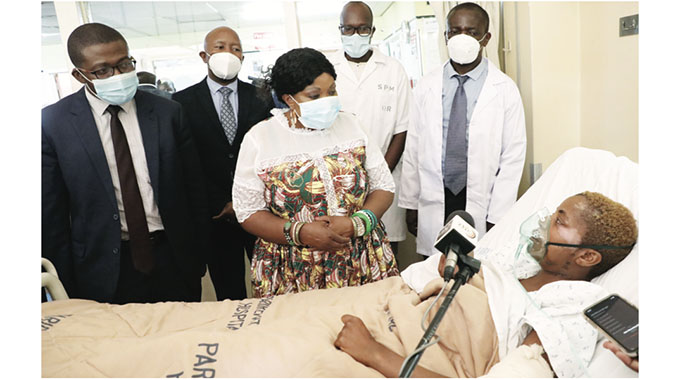Source: First Lady visits jumbo attack victim | The Herald
Tendai Rupapa
Senior Reporter
HEALTH Ambassador First Lady Auxillia Mnangagwa yesterday fought back tears when she visited Mrs Anna Maswani (30) of Chitungwiza at Parirenyatwa Group of Hospitals who sustained serious injuries following an elephant attack at Musamba Fishing Camp in Kariba.
The First Lady is also the Envi- ronmental, Tourism and Hospitality Industry patron. Mrs Maswani, who was injured last week, was writhing in pain and struggling to breathe, which also affected her voice projection.
The mother of three children aged nine, eight and two was walking along- side three other women in search of a fish permit when they unfortunately found themselves in the middle of an elephant herd.
“We wanted to get a permit to buy fish for resale in Kariba,” Mrs Maswani said from her hospital bed.
“There were four of us and as we walked we did not notice that an ele- phant had emerged from the forest. We were frightened when we eventually noticed that it was an elephant.
“When we ran to the left side, there was one calving elephant while on the opposite side there was yet another one. When others ran forward, I was con- fused. By the time I also started run- ning, I saw that a jumbo was catching up with me and I fell down.
“It lifted me with its trunk and perched me to a nearby mutamba tree.” In a soothing voice, the First Lady said: ” I have come to see you my daughter. When I had of your plight you were still very far away and had not reached this hospital. How do you feel now, the whole body from when it occurred up to this day?”
In response, Mrs Maswani said she felt better.
The mother of the nation added; “We wish you a speedy recovery mwanangu. We will be coming to see you, but are you managing to eat? Is the pain subsidising?”
Mrs Maswani said the pain was still to disappear as it continues to strike her at intervals. She thanked the First Lady for finding time from her busy schedule to check on her and incline an ear to her story.
Speaking to journalists on the sidelines of the visit, Amai Mnangagwa decried the surge in human-wildlife conflicts and spelt out the need strengthen the implementation of strategies to fight them.
According to statistics from ZimParks, 19 people have so far this year been killed in human-wildlife conflicts, while 26 have been injured.
The conflicts have claimed thousands of cattle, goats and donkeys.
“We have come here to Parirenyatwa Hospital to see Mrs Maswani who was trampled by an elephant,” said the First Lady.
This is a result of what is happening in our communities between humans and wildlife. Human-wildlife conflicts are an increasing threat requiring both short-term and long term interventions for local commu- nities in Zimbabwe.
“As a wildlife-rich country, human-wildlife conflicts have now escalated to higher levels in Zimbabwe and our country is now only second to Botswana as the nation with the most elephant population in the world.
“This fight usually occurs when wildlife causes direct and recurring threats to the livelihood and safety of people. Sometimes also resulting in the persecution of the wildlife species involved and even retaliation killings for any losses.”
The First Lady said there was no debate, however, that there was no greater loss than the loss of human life.
“It is heartbreaking to see people suffering permanent injuries after encountering dangerous wildlife which is flourishing and roaming wild free around people everywhere in the country,” she said.
“These human-wildlife conflicts are also the basis of land use strife between stakeholders that should be working together progressively towards Vision 2030. This is why the Government of Zimbabwe made deliberate efforts to review the Campfire programme and one of the shortcomings of the old Campfire model is the lack of devolution to the grassroots level.”
Newer Post
Businessman Zingman freed after DRC arrest Older Post
Credible information key: VP Chiwenga 
COMMENTS